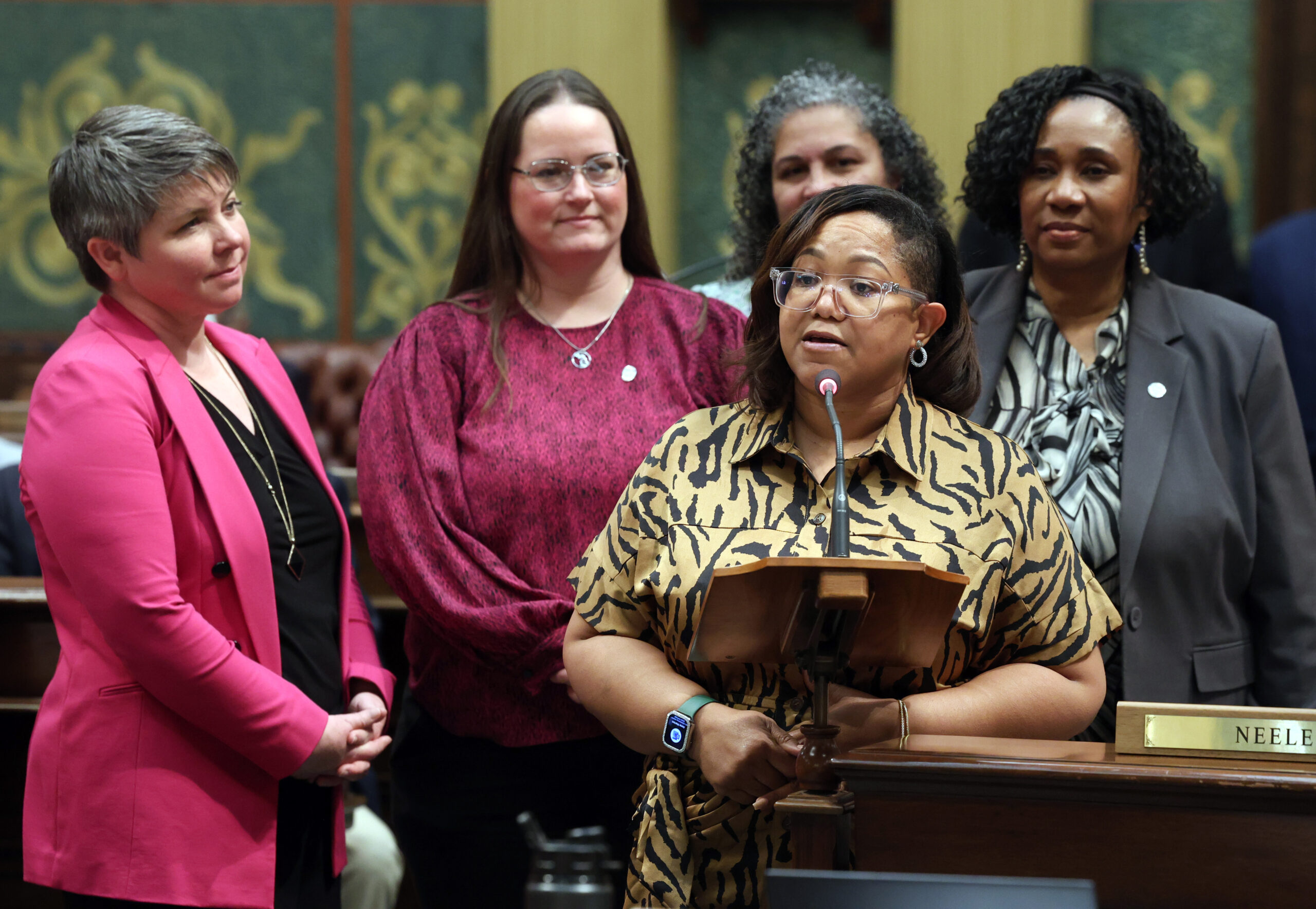Lawmakers observe the unique challenges that affect the mental health of racial and ethnic minorities

State Rep. Kimberly Edwards (D-Eastpointe) stands with Reps. Stephanie A. Young (D-Detroit), Felicia Brabec (D-Pittsfield Township), Carrie A. Rheingans (D-Ann Arbor) and Betsy Coffia (D-Traverse City) as she speaks on the House Floor on Tuesday, March 5, 2024, at the state Capitol in Lansing.
LANSING, Mich., July 11, 2024 — In recognition of Black, Indigenous and People of Color (BIPOC) Mental Health Awareness Month, legislators in the Michigan House of Representatives are highlighting the importance of mental health, sharing their work to combat the stigma of mental illness and advocating for improved access to mental health care. This month is dedicated to focusing on the unique mental health challenges faced by communities of color and the steps that can be taken to bring more understanding, healing and support.
“Addressing the mental health crisis openly and without judgment is essential for the well-being of our constituents. The stigma around mental health prevents too many people from seeking the care that they need. By fostering a culture of understanding and support through legislative decision-making, we can work toward helping individuals feel more safe and empowered to prioritize their well-being,” said state Rep. Kimberly Edwards (D-Eastpointe), MSW.
One significant barrier to mental health care is the persistent stigma surrounding mental illness. Many individuals with mental health conditions feel ashamed or afraid to seek help due to societal misconceptions and prejudices. During BIPOC Mental Health Awareness Month, it is crucial to emphasize the importance of ending this stigma. By fostering an environment of acceptance and empathy, more people can be encouraged to seek the help they need without the fear of judgment.
“Stigma remains a formidable barrier, preventing many individuals from seeking the help they need. We must continue to foster a culture of acceptance and understanding. By prioritizing mental health in our legislative efforts and working to ensure accessible, quality care for all Michiganders, we can make a profound impact on our communities. Everyone deserves the opportunity to live a mentally healthy, fulfilling life,” said state Rep. Brenda Carter (D-Pontiac).
Reducing stigma is essential, but increasing the number of providers and ensuring everyone has access to quality mental health care is just as crucial. This includes removing barriers to care.
“One in five individuals experiences a mental health condition. Ensuring access to behavioral health care is vital for managing these conditions and enhancing quality of life. That’s why I am proud to sponsor legislation to bring more mental health trained professionals into the Mental Health Code. We must increase the number of providers to ensure all Michiganders receive the care they deserve,” said state Rep. Carrie A. Rheingans (D-Ann Arbor), MSW and MPH.
Many indigenous communities and communities of color, especially in rural areas, face a severe lack of mental health professionals, making it difficult for individuals to get the care they need. This underscores the importance of advocating for policies that increase funding for mental health services, support the education and training of new providers and enhance telehealth options to reach underserved areas. Addressing the provider shortage will enable more people to receive timely mental health care.
“We continue to live during a mental health crisis. A third of Michiganders living with mental illness have unmet treatment needs. While I am proud of the work that we have done, particularly around funding mental health programs, we still have much that can be done. We must focus on policies that address both access and workforce issues. If we don’t do this work, the mental health crisis will continue to grow,” said Rep. Felicia Brabec (D-Pittsfield Township), a practicing clinical psychologist.
Mental health is a crucial component of overall well-being, affecting how individuals think, feel and act in their daily lives. It influences one’s ability to handle stress, relate to others and make decisions. BIPOC Mental Health Awareness Month serves as a reminder of the importance of prioritizing mental health. Proactive steps towards maintaining mental well-being are essential, whether through mindfulness practices, seeking therapy or talking about feelings with trusted friends and family.
“In my capacity as a social worker, I’ve witnessed the profound influence mental health can have on every facet of a person’s life, whether it manifests positively or negatively. We must not shy away from discussing mental health — it’s a critical element of our wellness,” said state Rep. Betsy Coffia (D-Traverse City), BSW. “That is why during this month dedicated to mental health awareness, we should not only acknowledge areas for improvement, but we should also commemorate the strides we’ve made in reducing the stigma.”
###
